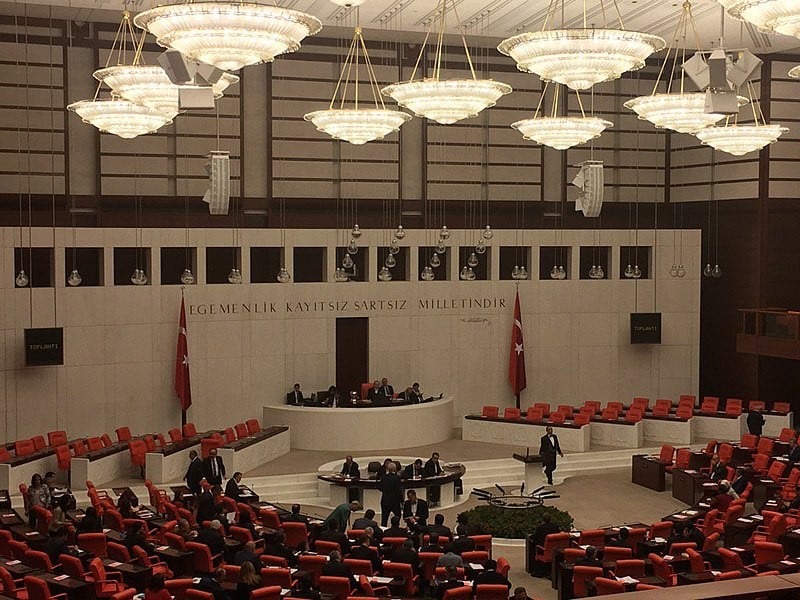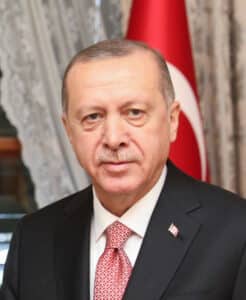Meeting of the Turkish parliament, 2016 (Wikimedia Commons)
The opposition and civil society in Turkey are outraged by the government’s intention to pass a new law against “disinformation.” The Venice Commission, a European watchdog, is also critical of the draft legislation, which criminalises the spread of disinformation and encourages censorship. Restricting freedom of expression worries active journalists in Turkey.
Disinformation or censorship?
The proposal submitted to parliament by the AKP and the MHP punishes the spreading of “disinformation” disproportionately. The 40 articles covered by the proposal include criminalising the dissemination of misinformation by citizens, which can carry prison sentences of 1 to 3 years. In addition, online media platforms must remove misinformation at the behest of the government. The government defends the bill by arguing that countering disinformation is an important issue. The bill was tabled already on 27 May, which was followed by fierce criticism from the opposition and civil society. Despite voting on the bill being postponed to this week, the first 15 articles of the bill had already been passed.
Critics of the bill believe it facilitates government censorship of criticism. For instance, the law is considered too vague to define what constitutes disinformation, and seems to severely restrict freedom of expression. The Venice Commission, an advisory body of the Council of Europe, has sharply criticised the bill. For instance, according to this European watchdog, there are alternatives to combat the spread of disinformation that are non-criminal. In its current form, the bill leads to “arbitrary restrictions on freedom of expression”, according to the commission.
Next year’s elections
The majority in parliament seems to support the proposal. This is not surprising, given that Erdoğan’s AKP has a grand majority in the national assembly with support from the MHP and BBP. Erdoğan’s government has an interest in securing a tighter grip on the media in the run-up to next year’s elections. In this way, Turkish security, economic and social problems can simply be labeled as disinformation and censored. According to opponents, the vagueness of the bill allows virtually everything to be interpellated, effectively giving the government free rein to smother criticism.
This gives Erdoğan’s government the means to, for example, deprive critical journalists convicted under the law of their press cards. Independent media is thus being harshly sidelined by Erdoğan’s increasingly authoritarian policies. The Venice commission stated their concerns regarding the bill as follows: “The Commission is particularly concerned with the potential consequences of such provision, namely, the chilling effect and increased self-censorship, not least in view of the upcoming elections in June 2023.”
The bill is a card Erdoğan plays to keep his challengers from power. Given the surprising result of the 2019 municipal elections, in which the AKP lost a local majority in Istanbul and Ankara to the CHP, Erdoğan’s manifested position seems less strong than previously thought. Several polls also suggest that there are chances for opposition parties to come to power as a six-member coalition in the June 2023 elections. For Erdoğan, that is certainly not an option. Therefore, this bill plays entirely to the advantage of his AKP.
Crackdown on press freedom in Turkey
Under Erdoğan, freedom of expression in Turkey declined further. Reporters without Borders ranked the country 149th in its 2022 World Press Freedom Index. Currently, 90% of Turkey’s media is under government control, forcing citizens to turn to the small group of independent media that still exist. A Reuters investigative report published in August 2022 demonstrated with many examples how Erdoğan has an authoritarian grip on media provision in Turkey. High monetary penalties are handed out to independent media criticising his government. In addition, journalists are already regular targets of lawsuits. In 2021 alone, 241 journalists were prosecuted.
It shows a trend in Turkey where the media is reporting increasingly less news, according to Faruk Bildirci who is a former journalist of Hurriyet. He states that: “The mainstream media in Turkey serves the function of concealing the truth more than reporting the news.” Also ahead of the elections, it is important to Erdoğan that grounds for criticism avoid entering the mainstream media. Fair elections in 2023 appear to be out of the question prematurely with this bill, since campaigning without transparent media is a contest that the opposition loses in advance.
Increasing pressure on democracy
Freedom of expression is one of the core values of democracy, but seems to be under increasing pressure in Turkey. It fits into Erdoğan’s style which has so far shown that through “hyper-presidency” -comparable to authoritarianism – he deviously restricts opponents’ influence. The troubled relations between Turkey and the EU only seem more damaged by policies like these. Whereas in 2019, EU accession negotiations for Turkish membership were suspended due to criticism of the Turkish government, the reasons behind this criticism only seem to be worsening.
Author: Mathieu Neelen
Sources: BalkanInsight, Euronews, ReportersWithoutBorders, Reuters1, Reuters2, SWPBerlin
Photo: Wikimedia commons



